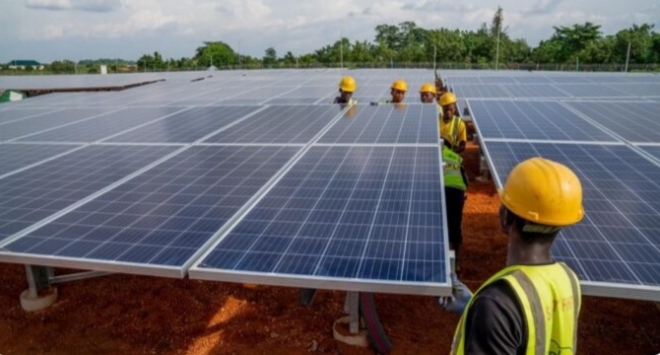The federal government of Nigeria has commenced the implementation of its plan to deliver electricity through solar energy, to no fewer than 25 million Nigerians whose communities are currently not captured on the national power grid.
Speaking during an event to mark the commencement of the programme in Jangefe, Roni Local Government Area of Jigawa State, Vice President Yemi Osinbajo, reiterated the determination of the President Muhammadu Buhari administration to give more Nigerians access to cheap and environmentally friendly renewable power.
Osinbajo the Solar Power Naija programme would continue across the six geopolitical zones in six states, namely, Edo, Lagos, Adamawa, Anambra, Kebbi and Plateau, in the first phase, and then move to the entire 36 states and the nation’s capital, thus, covering 25 million Nigerians at completion.
Read Also: EU to spend €10m for solar energy in Adamawa hospital
Jangefe community got 1,000 solar home system connections for its about 5,000 population, as part of a 100,000 scheme, with a local solar power company implementing aspects of the scheme.
Osinbajo said, ‘The president had emphasised that we could no longer rely solely on the grid if we were to electrify the whole country, which meant that we had to develop an effective strategy for decentralising power supply.
‘The Solar Power Naija programme, which is designed by the Rural Electrification Agency (REA), is an ambitious initiative that aims to create five million connections through a ₦140 billion financing programme that will support private developers to provide power for five million households, which means providing electricity for up to 25 million Nigerians.’
The vice president disclosed that the programme was a Public-Private Partnership (PPP) arrangement supported by concessionary lending via the Central Bank of Nigeria (CBN) and commercial banks. He emphasised that structures had been put in place to make the cost of the connections affordable for the target communities.
In addition to the concessionary lending rates, Osinbajo explained that the government had provided subsidies and rebates for private developers to the tune of over $200 million under the REA and World Bank Nigeria electrification programme. He lauded the Jigawa State governor, Mr Abubakar Badaru, the Emir of Kazaure, and other critical stakeholders for their role in ensuring the implementation of the programme in the community.
The vice president further commended the Emir of Kazaure, who made a down payment for the community to benefit from the solar connections, stating that the decision facilitated the programme.
AFRICA DAILY NEWS, NEW YORK










